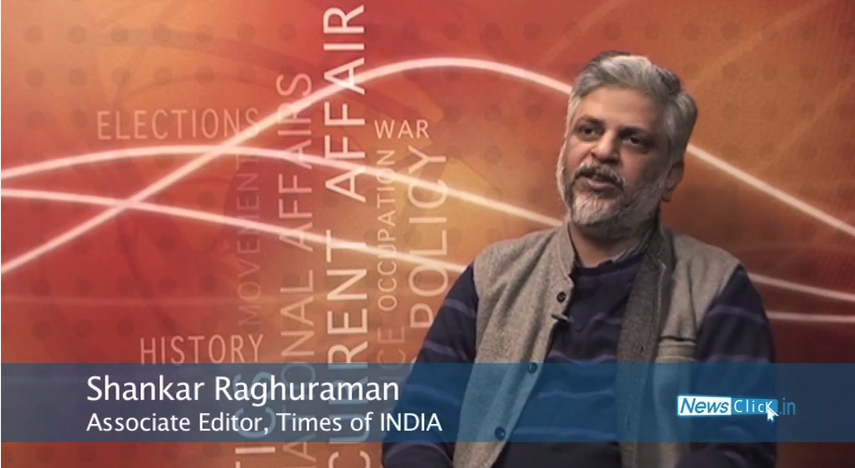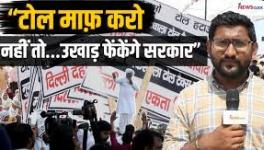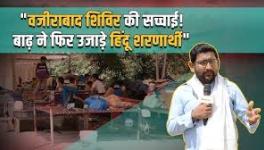How Real is BJP's Win?
Newsclick Interviewed Shankar Raghuraman, associate editor Times of India on the recently concluded assembly polls of Jharkhand and J& K. Shankar feels that there has been polarization in case of Hindus which has gone in favor of the BJP which gained all its seats from the Jammu region. As far as Kashmir is concerned it performed miserably as most of its candidate lost their deposits. The mainstream media portraying that BJP performed well in Kashmir region is a sham. On the question of forming alliances, Shankar feels that ideologically the PDP and the BJP are two opposite poles, but in period of opportunism, their coming together will not be a surprise. He also points out fall in the vote share of BJP in Jharkhand as compared to the Lok Sabha polls and thinks that failure of other parties to build alliances is an important reason for the victory of the BJP.

Pranjal(PR) : Hello and welcome to NewsClick. Today we have with us Shankar Raghuraman, Associate Editor, Times of India. We are going to discuss about the recently concluded Jharkhand and Jammu and Kashmir elections.
Hello Shankar.
Shankar Raghuraman(SR) : Hello
PR : Since we see the results, it looks like there has been a clear polarization. In Jammu BJP has gained the majority where as in Kashmir PDP and National Conference got more seats. So what do you think in that sense?
SR : I agree with you that there has been a polarization, both regionally and in communal terms there has been a polarization but it’s a strange kind of polarization. What’s happening is the Hindu dominated area of the Jammu region; there are about 25 seats in that region. BJP has won 22 out of those seats, one of its rebels has won another seat and NC I think has won the other two. So it’s a near complete sweep of the Hindu dominated parts of the state by the BJP. In fact it got 48% of the vote in those 25 seats but in the valley and in the Muslim dominated parts of the region it has much more been an even battle. So judging by the trend it appears that while there has been Hindu consolidation in favor of the BJP there hasn’t been a corresponding Muslim consolidation favoring any one party, the Muslim votes seem to have splintered between PDP, NC and Congress. Nevertheless this is perhaps the first time that such an explicit polarization is taking place in the Jammu and Kashmir and that is obviously not a very good sign for the future of the politics of the state.
PR : we also see that BJP has been able to gain good amount of vote in Kashmir. What is the reason behind that? What do you think could be the possible reason behind that?
SR : Actually it hasn’t gained much of a vote in Kashmir, it has been trying to project as if it done a very good job in Kashmir, the reality is that except in one seat in the valley it has lost its deposit in all the other. There is only one seat in which it didn’t lose its deposit and overall its vote share in the Kashmir valley is 2.2%, so it hasn’t actually made any significant inroads in that part of the state.
PR : what do you think would be the alliances which may come to form the government.
SR : if you look at the arithmetic of the thing, PDP has 28 seats, BJP has 25, NC has 15 and Congress 12. So that’s among the four larger parties. It appears that the only combination that can make a majority is the PDP BJP combination because no other two parties by themselves get a majority but there are also seven others which include 2 from Sajjad Lone’s party, the Peoples Conference which has indicated that it is likely to go with BJP. So arithmetically PDP BJP seems the most viable combination but ideologically that seems the most illogical combination because those are the two parties which perhaps disagree most violently on most things relating to Kashmir yet we know opportunism is rife in Indian politics so it wouldn’t be a surprise it that is what finally happens.
PR : many are saying it’s an end of a party like Congress. What do you think in that sense, is that really an end of Congress? or is there any scope for revival in such a situation for alternative politics which gives substitute for both BJP and Congress itself.
SR: previous history suggests that wherever in a state it goes down below a certain level, it becomes very hard to recover. We have the example of Tamil Nadu, Uttar Pradesh and Bihar; well now even Gujarat and Chhattisgarh, Madhya Pradesh and so on but I would be reluctant to right off the congress so easily either in Jharkhand or Jammu and Kashmir and we must also recognize that in this highly polarized election in Jammu and Kashmir the only party that has won seats in the valley in Ladakh and in Jammu is the Congress. No other party, the PDP hasn’t won in Ladakh, it hasn’t won in the Hindu dominated parts of Jammu, the BJP has won only in Jammu, the NC hasn’t won in Ladakh. So, it is only Congress that has won in the broad division of the state. Therefore we should not rule it out that soon. That having been said it is now also becoming clear that the congress is not being perceived as the most effective vehicle to take on to BJP in the Modi era as it were. So in election after election, in Maharashtra for instance the NCP and Congress were in alliance, they broke up just before the elections and the congress seems to have suffered worse as a result of the break up than NCP. Similarly in Jharkhand JMM and Congress went their separate ways and again the JMM survived the breakup much better than the Congress. Again, in Kashmir the NC has survived the breakup much better than the congress had. So clearly, it is the regional parties that are being seen as the obvious counter to the BJP as such and it now up to those regional parties to try and forge sort of non BJP and non Congress alliance as you mentioned.
PR : Since when Jharkhand has been formed, 9 years there has been a BJP government and it has been one of the most under developed state that have existed in India so far despite of so many sources available but still BJP is gaining a clean majority so it is clearly visible that it’s a Modi magic that is prevalent in these areas. Would you agree with it?
SR : BJP has not gained a majority, BJP with its allies, the All Jharkhand Students Union Party; the two between them have 42 seats just one more that they need to form a majority. So far no single party has got a majority in Jharkhand and that remains true even after this election. Does that mean that Modi magic is at work? Yes and No. I mean, clearly Modi was the main theme of BJP’s campaign in Jharkhand. In fact all the way after the parliamentary elections what we have noticed is that BJP doesn’t project anybody as the chief minister, they are banking on the Modi wave to win in state after state. So, yes the Modi factor is working but we must also realize that there is a 9% fall in the BJP’s vote share in Jharkhand from the Lok Sabha election to the assembly election. So it is also veiling in some sense.
PR : do you also think it is failure of alliances in terms of Jharkhand when we talk about JMM and Congress split, Congress JDU didn’t get that much vote which they should have got and if we see at left parties there was no alliance between them at all and there are a few seats where left parties have led to the loss of another left candidate there. So what do you think on that?
SR : certainly the BJP’s victory can be described as partly to the fact that the opposition was totally fragmented. I mean, if the Congress and JMM had remained in an alliance. Now it is always risky is politics to add up the vote shares of two parties which have contested separately and they would have got that many votes if they had contested together but nevertheless is does give you some idea. The fact is that the JMM plus Congress is almost equal to the vote share of the BJP. So yes the contest would have been very different if congress and JMM had been in an alliance. Similarly it obviously makes sense for the left particularly in states where they have limited pockets of influence not to be contesting against each other. What implications it would have on Delhi elections?
SR : See, it has some implications definitely, for example, let us say BJP had lost in Jharkhand then there would have been a perception that the Modi wave has come to an end and its business is usual again. As things stand the perception is that the Modi Jaganath continues to roll on. So to that extent it will help the BJP in Delhi but on the other hand the dynamics of Delhi are completely different after the entry on AAP into the elections last year. The dynamics of Delhi are completely different from the dynamics of politics anywhere else in India at the moment. So AAP is a new phenomenon in Indian politics, it is still finding its feet, you know, people are coming to terms with what it means or reaching the judgment of what it means. So I do not think that one can extrapolate from other parts of India to Delhi that directly and that is evident also from the fact that the BJP has chosen not to push for an election in Delhi for so long. You would have expected after their victory in the Lok Sabha elections wherever they won 7 Lok Sabha seats in Delhi by a margin of over a lakh. You would have picked them to be eager to hold the assembly elections as soon as possible on the contrary they have looked like they wanted to delay as much as possible.
PR : thank you Shankar for giving us your time. We will be coming back to you on such issues.
Thank you for watching NewsClick.
Get the latest reports & analysis with people's perspective on Protests, movements & deep analytical videos, discussions of the current affairs in your Telegram app. Subscribe to NewsClick's Telegram channel & get Real-Time updates on stories, as they get published on our website.
























